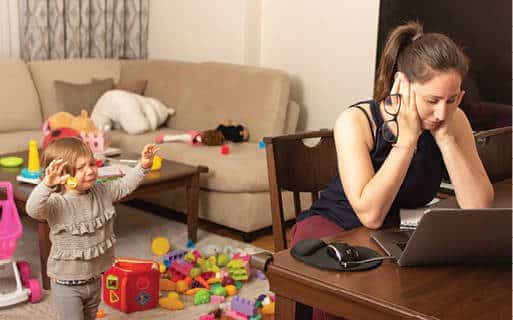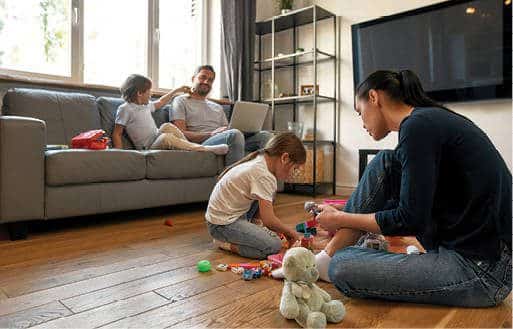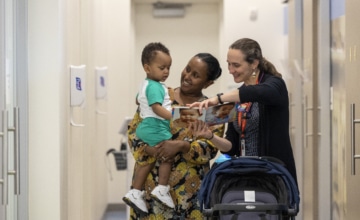Elizabeth Myung Sook Krause, Perigee Fund, Seattle, Washington; and Beth L. Green, Portland State University

Abstract
Parents with young children receiving relationship-based home visiting and infant and early childhood mental health (IECMH) services want flexibility and hybrid approaches that combine in-person and remote services. This is the top finding from a national study of parents served by seven geographically and demographically diverse program sites across the US. Centering the needs of parents and caregivers who must now engage in services with their children in different ways is critical for equitable service delivery. To do so calls on early childhood leaders to find the openness to change, backed up with practice adaptations that families value.
Editor’s note: The information in this article is adapted from Listening to Parent Voices: How Technology Changed What’s Possible in Home Visiting & Infant Mental Health Programs (2021), available online at link
Perigee Fund is a 4-years-young national philanthropic organization working to advance mental health (maternal, infant, and early childhood) and family supports for well-being (e.g., paid family leave, early childhood education infrastructure). Perigee centers families with children prenatal-to-3 that have been affected by trauma, racism, and poverty.
In the spring of 2020, as COVID-19 was forcing the world to make quick pivots for public health, Perigee started hearing mixed prognostications from field leaders and providers about how remote and technology-enabled services would work, or not, in fields that are relational and focused on young, pre-verbal people with short attention spans. We heard from many that services and supports delivered over videoconferencing platforms and social apps, texts, and calls would never be acceptable, as well as fears that if accepted, such services would be to the detriment of deeply held field principles.
As a funder, Perigee turned to wonder and saw an opportunity to listen to parents about their and their children’s experiences and preferences. Perigee issued a request for proposals for a research partner and found synergy with the Early Childhood and Family Support Research Program at Portland State University, which brought on trusted and complementary collaborators from the Department of Human Development and Family Sciences at the University of Connecticut, and the Center for Child and Human Development at Georgetown University. To be clear, Perigee does not identify as a research funder. The Parent Voices Study was driven by caregiver perspectives as a necessity and by the rare opportunity to translate learnings during an extraordinary time into how families are centered and served.
Summary of Parent Voices Study Methods, Findings, and Recommendations
The research team took a qualitative approach using case studies of seven geographically disparate programs (see Box 1). In late 2020 and early 2021, researchers did in-depth interviews plus short surveys with 100 parents and providers engaged in relationship-based early childhood home visiting or infant and early childhood mental health (IECMH) services. Findings were highly consistent across sites despite variations in service models, demographic characteristics of families served, and local geographic and political contexts. See Box 2 for examples of parent comments.

Virtual visits eliminated or reduced travel time, made visits more convenient, and, for some families, increased comfort with staff. Photo: shutterstock/fizkes
What Changed for the Better
What parents and providers appreciate about hybrid services:
- Increased flexibility: Programs were able to change previous requirements related to duration, location, and mode of services. This flexibility allowed providers to maintain connections, supporting family retention and engagement.
- Improved logistics: Virtual visits eliminated or reduced travel time, made visits more convenient, and, for some families, increased comfort with staff.
- Increased provider creativity: Providers innovated new strategies for engaging both children and parents.
- Increased support for parent–child interactions: The virtual format required staff to focus on how to coach and support parents to directly interact with their children.
- Expanded focus on adult mental health: The stress of the pandemic increased the need for adult mental health support; familiarity with remote child services paved the way for adult services.
- Improvements in office- and clinic-based infant mental health services. For IMH services typically provided in offices or clinics, parents and providers described considerable benefits to observations and activities in a natural setting.
Box 1. Participating Sites
- Brockton Healthy Families, Massachusetts
- Family Building Blocks, Oregon
- Family Nurturing Center, Oregon
- Healthy Families America, Arkansas
- Inter-Tribal Council, Michigan
- Mary’s Center, Washington, DC
- Southeast Kansas Community Action Program
What Needs Improvement
Parents and providers felt some factors were not well suited for technology or would need additional innovation and problem solving to work effectively:
- Engaging the youngest children: Parents and staff both reflected on limits to engaging with babies and toddlers due to their developmental capabilities.
- Relationships between some parents and providers: Stressors facing families and staff sometimes impeded high-quality relationship-building interactions. This was more difficult for families who started services during the pandemic.
- Confidentiality and safety: Many families lacked private spaces and staff expressed concerns about sensitive discussions.
- Administering assessments: The hands-on nature of many developmental and other assessment tools made them challenging to administer over remote technology.
Box 2. Parent and Provider Voices
“I like the group activities a lot…I think it was 4 weeks ago where we did painting and stuff and, well, I did it with [child] and she was super happy and excited to do it, and she was helping me. And you also get to communicate with other moms and the workers and stuff. So, you get to know everyone, not just [home visitor], you get to experience and get to know everyone.” —Urban Parent/Caregiver
“When we’re not talking or whatever or I’m having a bad day, I get a text message from her…. It’s like, how’d she know I’m not doing too great?… I can talk to her like she’s my friend, but she’s not my friend. She’s my support person. It’s a big support for sure. I don’t trust a lot of people like I trust her.” —Rural Parent/Caregiver
“To be honest, during the pandemic, I was like, I don’t know if I really even want to do this anymore. It’s just on the phone and I’m just telling them about him. They’re not really seeing him. So, I was contemplating ending the program. But I noticed, they do help a lot with just making sure he’s on track with his progress, making sure that he’s meeting the milestones. … I don’t know how to explain it, they’re always willing to work with the kids.” —Michigan Tribal Parent/Caregiver
“She does accommodate to what we need. There are times when my girls are restless… [My home visitor] takes the time to finish the video call and changes the visit to a phone call. She adjusts to the needs of my girls very well so we can have our visit with her.” —Latina/x Parent/Caregiver
“Our communication has increased for good, because she has communicated more with us…because before, it was only the visit to the house once a month, but now she brings activities, books, or papers to sign, text…. I think we have been more in contact now than before.” —Rural Parent/Caregiver
Ten Recommendations
Incorporating lessons from parents and providers now and into the future suggests the following:
- Find the openness to change. What might have seemed impossible before the pandemic was made possible through flexibility and quick responsiveness to the needs of parents. Programs must actively listen to the voices of parents and be open to small or big shifts in practices.
- Increase access to adult mental health services for both caregivers and the workforce, including telehealth.
- Expand availability of IECMH consultation to infant and toddler programs to provide additional mental health support to families and to build staff skills and capacity.
- Add flexibility to evidence-based models already proven to work, especially related to frequency, duration, and mode.
- Embrace hybrid approaches, blending the best of both worlds (e.g., in-person for initial relationship building and assessments, virtual for some sessions and check-ins).
- Rethink how programs support basic needs. Family needs increased during the pandemic, programs were there for families, and families deeply valued the support. Stability undergirds child development and the capacity of parents to engage in relationship-based work. Trusted programs should consider ways to expand capacity to continue helping families meet basic needs without compromising core services.
- Invest in planning and advance preparation for visits. Flexibility needs planning and structure in order to work. Parents appreciated the additional pre-visit preparation.
- Explore leaning into a parent coaching model of support. Because providers could not model or demonstrate directly with children, many developed improved techniques for coaching parents as they interacted with their children.
- Continue to expand support for staff. Additional workforce support, such as mental health services, peer learning communities, and flexible scheduling, was a key factor in programs’ ability to provide quality services. Retaining those supports and strengthening quality supervision and peer supports could have long-term benefits for staff retention.
- Consider continuing group-based support, including hybrid approaches for delivering parenting education, support groups, and play groups. Isolated parents appreciated connection with other parents and children.

Programs must actively listen to the voices of parents and be open to small or big shifts in practices. Photo: shutterstock/Ersin Tekkol
While parents and providers readily conceded that technology-enabled services come with some real limitations, balancing practical conveniences, 67% of parents and 68% of providers would like to continue some support remotely into the future.
Straddling Before, During, and After COVID-19
Relationship-based home visiting models and IECMH services have long been essential early childhood interventions, building on the science of early social–emotional development and the immense role parents play.
Programs told the researchers that they initially worried they would lose families in the shift to remote services and worried about their ability to provide these deeply relational services through virtual platforms. Parents were supporting older children in remote school, experiencing displacement from job losses and other concurrent natural disasters (e.g., Oregon forest fires), and grappling with stress. At the same time, parents and caregivers feared their children would not meet important milestones without support. That the programs were able to largely retain families and bring new families in is a huge credit to both parents and providers.
Data (Deoni et al., 2021) from a longitudinal study of child health confirm that the pandemic is affecting early child development and creating serious equity concerns. Babies born during the pandemic show “significantly reduced verbal, motor, and overall cognitive performance compared to children born pre-pandemic. Moreover, we find that males and children in lower socioeconomic families have been most affected” (p. 2). This research suggests a current and mounting need to increase services for babies born during the pandemic and their parents because of how the pandemic has shaped their early experiences.

Parents were supporting older children in remote school, experiencing displacement from job losses and other concurrent natural disasters (e.g., Oregon forest fires), and grappling with stress. Photo: shutterstock/BAZA Production
A robust and equitable early childhood service continuum that centers caregivers is urgently needed. Complicating the hereafter, the continuum must support families who started receiving services before the pandemic whose lives are now more complex, families with babies born during the pandemic, and families whose future babies will be born next year or 2 years from now, into a more hybrid-oriented world.
Systematizing Flexibility and Adaptations
At the time of writing, the Omicron variant had just overtaken the Delta variant as the dominant COVID-19 strain in the US; COVID vaccines were still in trials for children under 5 years old; and a sweeping federal social spending proposal, with cash, early childhood education, and health care provisions for prenatal-to-3 families, had just been dealt a major political setback. Uncertainty is given. So too is the mission to flexibly and equitably support families with adaptive relevance.
Adaptations can and should continue to be developed, tried, and modified at the program level closest to families and communities. Systemic transformation is needed with the engagement and bold leadership of policy administrators, funders, and model developers that sculpt the container for service delivery. While the pandemic created an opportunity to responsively change models, intentional and proactive decisions are required moving forward.
It took 18 months for the Parent Voices Study to go from an idea to bringing insights to the field. With other studies ostensibly on similar timelines, we are on the cusp of more data, and yet there is much more to learn. The introduction to the special COVID-19 issue of Early Childhood Education Journal (Pattnaik & Jalongo, 2021) discussed navigating through what is known, unknown, and emerging while delivering services, rebuilding, and aspiring to a new better. As complementary studies emerge and shed light on workforce, fidelity, outcome, and cost considerations of early childhood hybrid services, we hold that qualitative parent perspectives, too, deserve a serious place at the table because parent engagement in hybrid early childhood service delivery is a must.
Researchers leading the Parent Voices Study concluded the cross-site report (Chazen-Cohen et al., 2021, p. 32) with this clarion call:
[Recognize] what it took for these early childhood services to more fully actualize a truly family-centered and family-driven approach—namely, a global pandemic that led to broad societal shifts in personal, social, and work-related behavior. While previously, these evidence-based models required adherence to a relatively strict set of implementation guidelines thought to enhance program effectiveness, suddenly there was a need—and willingness—to change practices and to “do what it took” to respond to families’ needs…. Thus, the pandemic created an opportunity to change long-standing assumptions rooted in White-positivistic ways of knowing about what it takes to provide effective services. During the pandemic, programs changed these standards and challenged these assumptions in ways that perhaps more fully realized core values of relationships, responsiveness, and family-centered, in ways that may actually promote broader program effectiveness…. keeping this lesson in the forefront—and moving forward in a way that advances a truly equity-oriented approach without falling back on standard, white dominant models and requirements will require collective will to continue to make changes and question assumptions about what is important to families.
Learn More
Perigee Fund Parent Voices Study
Find links to the Executive Summary, the full report, and community case studies at link
Author Bios
Elizabeth Myung Sook Krause, ScM, is director of programs at Perigee Fund. At Perigee, she advances prenatal-to-3 mental health through health systems, policy advocacy, birth equity, and practice change. Internally, she provides leadership to the program team and facilitates Perigee’s equity journey. It has been her honor to serve others through a career in philanthropy spanning more than 15 years and three foundations from Connecticut to Texas to Washington. She holds a master’s degree from the Harvard T. H. Chan School of Public Health and a bachelor’s degree from Smith College. Her most cherished role is mother.
Beth L. Green, PhD, is a research professor and director of Early Childhood & Family Support Research at the Center for the Improvement of Child and Family Services at Portland State University. Dr. Green has been partnering with community-based programs for 25 years to design useful and rigorous evaluation and research studies to help improve services for young children and their families. Dr. Green earned a doctorate in social psychology from Arizona State University, with an emphasis on applied research methods. She then spent 3 years at the University of Pittsburgh’s Office of Child Development, where she learned the value of community partnerships and listening to parents as a means to build continuous learning systems for early childhood programs. Her areas of expertise include home visiting, child abuse prevention, early childhood mental health consultation, early childhood care and education, and Prenatal-Grade 3 systems. She partners with families and staff in early childhood, K–12, home visiting, and other systems to collect information that informs program planning and continuous quality improvement.
Suggested Citation
Krause, E. M. S., & Green, B. L. (2022). Listening to parent voices: How technology is changing what is possible in relationship-based services. ZERO TO THREE Journal, 42(3), 19–23.
References
Chazan-Cohen, R., Fisk, E., Ginsberg, I., Gordon, A., Green, B. L., Kappesser, K., Lau, S., Ordonez-Rojas, D., Perry, D. F., Reid, D., Rodriguez, L., & Tomkunas, A. (2021). Listening to parent voices: How technology changed what’s possible in home visiting & infant mental health programs. Report submitted to Perigee Fund, Seattle WA. link
Deoni, S. C. L., Beauchermin, J., Volpe, A., Viren, D., & the RESONANCE Consortium. (2021). Impact of the COVID-19 pandemic on early child cognitive development: Initial findings in a longitudinal observational study of child health [Manuscript prepared for submission]. link
Pattnaik, J., & Jalongo, M. R. (2021) Early childhood education and care in the time of COVID-19: Introduction to a special issue of Early Childhood Education Journal. Early Childhood Education Journal, 49, 757–762. link




